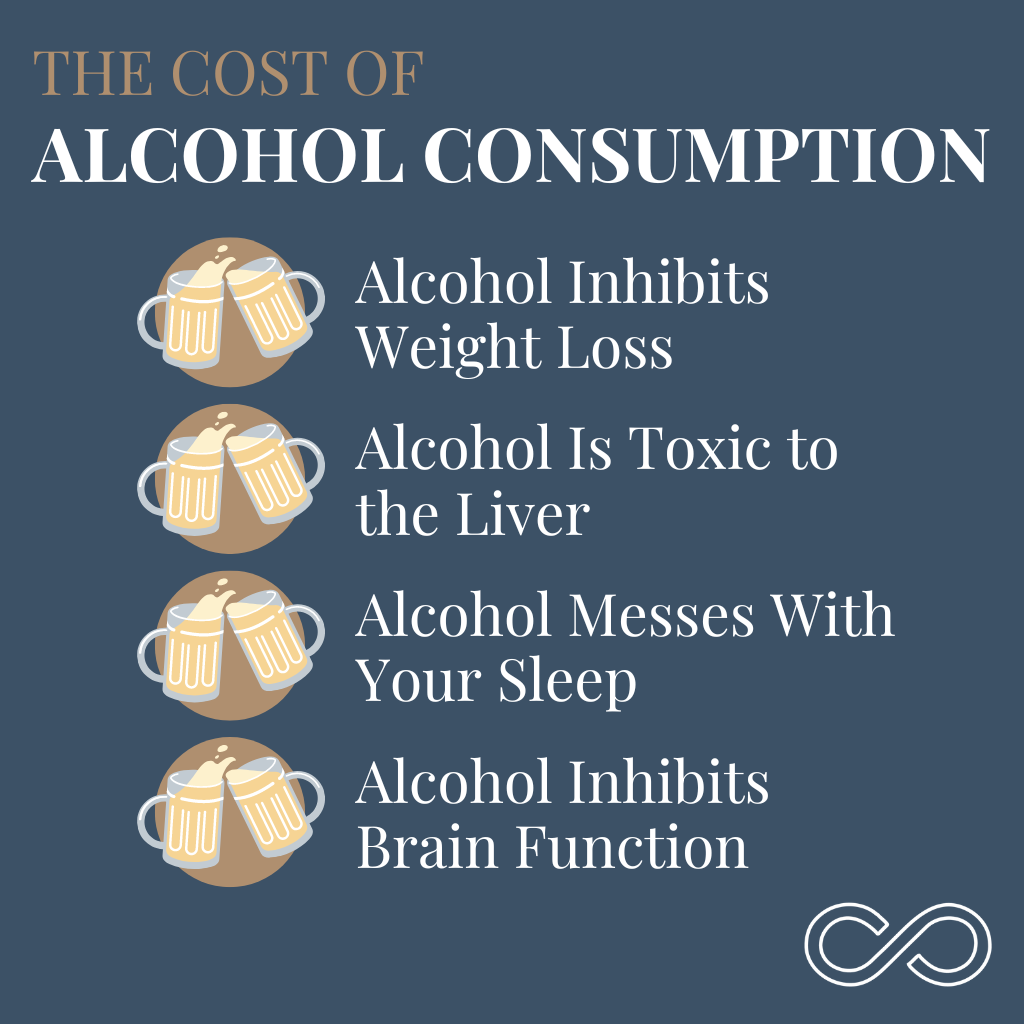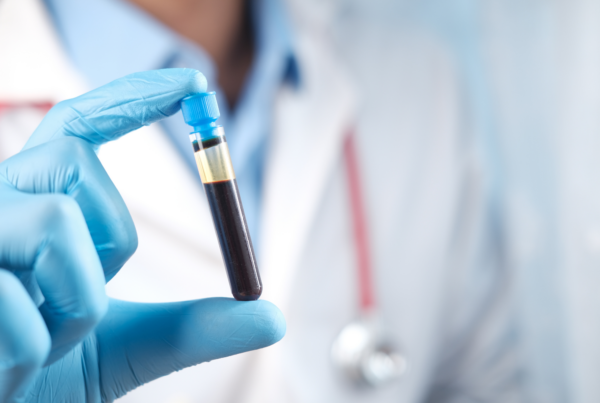Download file | Play in new window | |
If you consume any amount of alcohol, this is a conversation for you regarding how to think about it. Don’t imbibe at all? This discussion may not be for you — although you might find it interesting (along with some of our past articles on the subject).
We’re not here to bash alcohol or suggest you become a teetotaler. We only want you to be thoughtful about why you consume alcohol and how it affects your body and mind. Because if you have health goals — and if you’re having trouble meeting them — you’re probably underestimating the effects alcohol has on your progress.
The Pleasure Principle: Two Benefits of Alcohol
Why do you drink? Maybe you sip when you’re happy, when you’re sad, when you’re bored, or when you want to feel less inhibited. Whatever the reason, alcohol meets a need. If your need is relaxation or pleasure, alcohol is ridiculously effective at getting you there.
Alcohol affects two neurotransmitters associated with these blissful mind states: GABA and dopamine. Each of these has a pathway in the brain, and alcohol enhances both these pathways.
GABA (gamma-aminobutyric acid) has a suppressant effect. It’s counterintuitive, but stimulating GABA actually slows you down and relaxes you. This is why a drink or two after work or before bed feels so nice. Alcohol helps you “land the plane” at the end of the day — and it works really well at helping you unwind.
Then there’s dopamine, which some people call the “sex and chocolate” hormone. Dopamine is all about pleasure. It’s also the predominant chemical in any addictive behavior.
Normally, you have to work hard and wait long periods of time between dopamine experiences; addiction is a hack for getting at that dopamine, and people live for that pleasure and thrill. The problem is that any addiction — including alcohol — creates dopamine dependence. Dopamine is a drug, and people seek bigger and more frequent doses of alcohol to get it.
Oftentimes, the dopamine from alcohol helps numb you against a painful reality. It takes you from a perceived less ideal state to a perceived more ideal state. Unfortunately, these brain-based benefits of alcohol are short-lived, and they come at a cost.
Alcohol Wrecks All Kinds of Bodily Havoc
While the “positive effects” of alcohol are genuine and enjoyable, their negative counterparts last longer, and they carry far more serious health consequences.
Alcohol Inhibits Weight Loss
Alcohol is empty calories, meaning it’s high in calories but devoid of nutritional value — and it’s often combined with sugary mixers. Strangely, alcohol is often left out of the equation when we consider macronutrients, as if alcohol doesn’t count among the carbs, fat, and protein in a person’s diet.
The fitness and media worlds often tout (or imply) that all calories are created equal, meaning the source of your calories is irrelevant as long as you’re in a calorie deficit. I disagree, and I’ve gotten pushback for my stance on this. But it’s painfully clear that a calorie from a piece of broccoli is not the same as a calorie from an M&M or a potato.
Calories affect our biochemistry differently in how they’re processed, meaning some help create muscle, some help burn fat, and some make fat. And yes, alcohol can readily and easily be deposited as fat.
Traditionally, creating a calorie deficit has been the North Star for losing weight. But not everyone who achieves a calorie deficit loses weight (and not everyone in a caloric surplus gains weight) — because all calories are not created equal. If you want to lose weight, you need to consider your alcohol consumption.
Alcohol Is Toxic to the Liver
Your liver is one of your body’s unsung heroes, involved in metabolism, toxin filtration, and glucose creation. Alcohol shuts down the metabolic engine of the liver, specifically the metabolism of cholesterol, glucose, and triglycerides. The liver has to process and clear alcohol, and it has an effective pathway to do so. But alcohol disrupts these processes — frequently leading to high cholesterol, high blood sugar, and high blood pressure.
Further, if you drink too much alcohol, your liver can become a place for excess fat to be stored. This can quickly progress to fatty liver disease, which over time results in irreversible liver disease and, potentially, the need for transplantation.
Alcohol Messes With Your Sleep
If you drink after 5 p.m., you can pretty much count on less-than-optimal sleep. Yes, alcohol can help you fall asleep, but you won’t sleep well.
Jen tracks her sleep using an Oura Ring. She’s noticed that when she consumes alcohol (which is infrequently), her heart rate goes up and her heart rate variability goes down (a sign of strain). The adrenal glands are working to pump that alcohol through her system, and she sees a low sleep score on her Oura Ring the next morning.
A drink may soothe your stress in the evening, but it also prevents you from getting the full benefits of recovery while you sleep — and you carry that lack into the next day. Over time, this can lead to chronic fatigue and inflammation.
Alcohol Inhibits Brain Function
Alcohol suppresses brain function, which isn’t earth-shattering news — but let’s look at the details. The three main brain victims are the:
- Cerebral cortex
- Hypothalamus
- Cerebellum
The cerebral cortex governs executive function and decision-making. People often make poor choices when they overindulge, leading to morning-after regret. Worse, some people end up in situations where there is no morning after.
The hypothalamus is your brain’s performance center — think athleticism and sex. Alcohol dampens your abilities and makes you unable to perform at a high, or even normal, level.
Finally, the cerebellum is your balance center. That’s why a sobriety test includes walking in a straight line. Whether you’re fully intoxicated or mildly buzzed, this can be challenging. And let’s not forget the nauseating spinning sensation that can accompany a drinking session.
Action Steps
If you drink alcohol once or twice a year, you may not experience any ill effects. But if you imbibe monthly, weekly, or daily, it’s worth considering how alcohol consumption affects your overall health. Here are some steps you can take:
Assess Your Health Goals
If you’re trying to lose weight and you’re drinking two or three glasses of wine a night, it’s going to impede your progress. And if you’re trying to sleep better, your alcohol consumption could be the missing variable. Make a list of your priorities and be clear on your health goals. Ask yourself:
- How much am I drinking?
- How often am I drinking?
- Why am I drinking?
- What am I trying to accomplish with my health?
Audit for Friction
I often say that all progress begins with telling the truth. So make an honest assessment of the benefits and risks outlined above. This will allow you to see where there’s a lack of congruency between your alcohol consumption and your health goals.
It can be easy to underestimate alcohol’s impact, and it can be difficult to get feedback on how much is too much. Friends and family may not be the best judges. For example, a breakfast mimosa is common and acceptable, so people may not even factor this in as alcohol consumption. Unless someone is obviously intoxicated, it’s hard to gauge how much they’re drinking.
Humans aren’t great at managing abundance. Take cookies, for a silly example. Most of us don’t prohibit ourselves from having a cookie here and there. The problem arises when cookies cease to be something special and become part of your everyday habit in greater and greater quantities.
Similarly, alcohol is readily available throughout the day in our society, which means you need to be thoughtful about when and how much you consume.
Moderation Works for Most
From a pure health perspective, alcohol has no measurable benefits. But alcohol itself is neither good nor bad — it just is. For most people, there’s no need to give it up entirely. I like to recommend a 50% reduction. You can cut the number of days per week that you drink, or you can have fewer or smaller drinks when you do.
Get some positive momentum going with these quick wins in reduction, and then see where you are. You can track your sleep, and your doctor can monitor your blood work, blood pressure, blood sugar, and body composition. You’ll see how alcohol affects your body, and it may be the motivation you need to cut down further or eliminate it altogether.
If you’re looking to give up a heavy or uncontrolled drinking habit, it’s best to seek professional help. Alcohol detox can be difficult and dangerous, and it’s best done under supervision.
Final Thoughts
Our members are looking to live optimally, which makes auditing for the effects of alcohol very important. Our bodily systems are delicate. They’re in homeostasis most of the time, but alcohol can throw off that balance. If you consume alcohol and are having trouble achieving your health goals, find the right doctor to help you figure it out.
Alcohol is seductive, but consumption comes at a cost. Ask yourself how much you’re willing to “spend.” If we’re honest, most of us are overpaying.

Dr. Aaron Wenzel is a concierge physician specializing in the care of fast-moving entrepreneurs, executives, and public figures in the Nashville, TN area. Dr. Wenzel’s diverse life experience and extensive training in family medicine, emergency care, nutrition, and hormone replacement therapies give him the unique platform to provide unmatched care for his patients.








